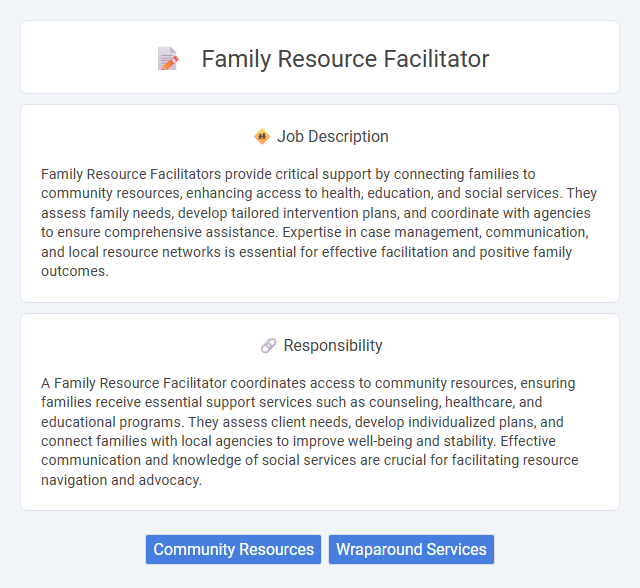
Family Resource Facilitators provide critical support by connecting families to community resources, enhancing access to health, education, and social services. They assess family needs, develop tailored intervention plans, and coordinate with agencies to ensure comprehensive assistance. Expertise in case management, communication, and local resource networks is essential for effective facilitation and positive family outcomes.
People experiencing challenges such as financial instability, limited access to social services, or family conflicts may be more likely to benefit from working as a Family Resource Facilitator, as the role involves providing support and connecting families to necessary resources. Individuals with strong communication skills, empathy, and patience probably suit this job due to the need to build trust and navigate sensitive situations effectively. Those who prefer structured, routine tasks might be less compatible with this position, which often demands adaptability and problem-solving in dynamic environments.
Qualification
A Family Resource Facilitator requires a minimum of a bachelor's degree in social work, psychology, or a related human services field, with preferred certifications in family dynamics or counseling. Proven experience in community outreach, case management, and knowledge of local social services enhances job performance. Strong communication skills and cultural competence are essential for effectively supporting diverse families and coordinating resources.
Responsibility
A Family Resource Facilitator coordinates access to community resources, ensuring families receive essential support services such as counseling, healthcare, and educational programs. They assess client needs, develop individualized plans, and connect families with local agencies to improve well-being and stability. Effective communication and knowledge of social services are crucial for facilitating resource navigation and advocacy.
Benefit
Family Resource Facilitator roles likely provide significant benefits such as connecting families with essential community resources and support services, which can improve overall family well-being. This position probably enhances problem-solving skills and fosters meaningful relationships, contributing to professional growth. It is also expected to offer a rewarding experience by positively impacting families' lives through effective guidance and resource coordination.
Challenge
The Family Resource Facilitator role likely involves navigating complex social and economic challenges faced by diverse families, requiring adaptability and strong problem-solving skills. Balancing limited resources with the urgent needs of families may present ongoing difficulties in fostering sustainable support. Success in this position probably depends on effective communication and the ability to build trust within communities.
Career Advancement
A Family Resource Facilitator provides essential support and connects families to community resources, enhancing child welfare and family stability. Career advancement in this role often involves gaining certifications in social work or counseling, pursuing specialized training in family services, and moving into supervisory or program management positions within social service agencies. Developing skills in case management, crisis intervention, and grant writing can also create pathways to higher-level roles and increased responsibility.
Key Terms
Community Resources
A Family Resource Facilitator connects families with vital community resources such as healthcare, educational programs, and social services to enhance overall well-being. They assess family needs and coordinate access to local support systems, including housing assistance, counseling, and employment services. Effective collaboration with community organizations ensures families receive comprehensive support tailored to their unique circumstances.
Wraparound Services
A Family Resource Facilitator specializes in coordinating Wraparound Services that provide personalized, community-based support tailored to the unique needs of children and families. This role involves collaborating with multidisciplinary teams to develop comprehensive care plans that integrate mental health, education, and social services. Expertise in navigating local resources ensures families receive continuous, holistic assistance promoting stability and improved outcomes.
 kuljobs.com
kuljobs.com